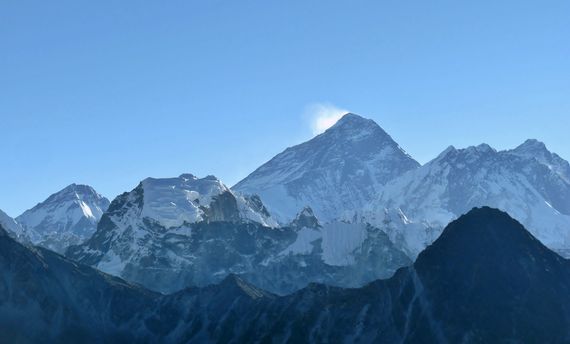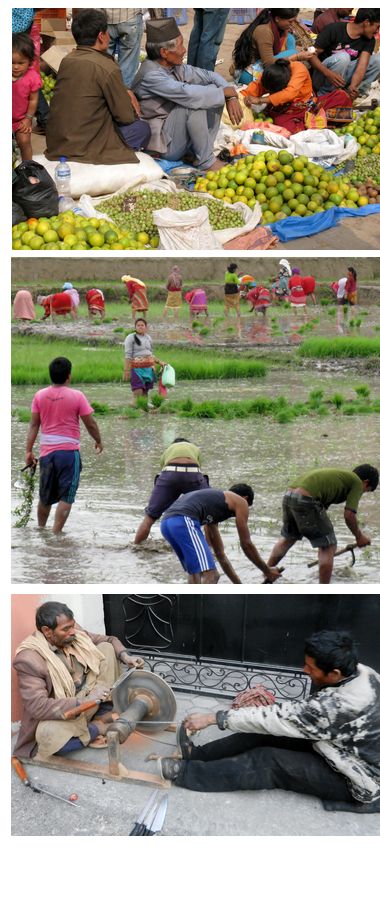LitClub: Kathmandu Readers Circle
Katmandu, Nepal

IN A REALM of MOUNTAINS beyond mountains, a group of English-speaking women gather together— in Kathmandu—to read, review and talk about books.
Tell us about your group. How many are you ... and why are you living in the Himalayas?
We have about 15 members—all women and predominantly British. Many are spouses of men who work for Britain's Department for International Development (DFID).
Other husbands are with the British International School, the UN, the British Ghurka regiment, or the British Embassy. One British woman is married to an American working with USAID.
Finally, we have an expat married to a Nepali man; and a Nepali woman married to an expat.
So what brought you together as a group?
We formed four years ago because it was hard to find English language books. There were none for sale and no library in Nepal. One of the few ways to get books was when someone returned from holiday with a bunch of new reads. These were all put in the pot for everyone to share, but there was rarely more than one copy of a given book.
So without multiple copies, we became a "reading circle" rather than discussion book club. Members give random reports on whatever book they've been reading.
But things are changing?
Right. The advent of Kindles and other digital reading devices has revolutionized how book clubs overseas can operate. Now its possible to download books at the drop of an Internet link, although some members report being unable to download to a device located in Nepal because, according to Amazon.co.uk, of "security concerns."
So have you read a few books together?
We have. Three times over the past year, we chose a book all of us agreed upon:
The Tiger's Wife, The Elegance of the Hedgehog, and Gone Girl.
And, although they weren't "chosen" books, it turns out most of us had read Blood of Flowers and Cutting For Stone, and we discussed both enthusiastically. Novels set in exotic places—"international fiction"—appeal to the members of our group, perhaps because they reinforce our experiences of living in far off cities.
Can you tell us about life in Nepal?
Member Karen Rae says, "This could easily be a 6 page thesis, but I'll try to summarize some of our members' remarks. These represent the good parts of living in Nepal as a Brit.
• Labor costs
Let's just be totally frank here. Anytime you live in a country where labor costs are a fraction of those in the developed world, one of the pluses is being able to (easily) afford "help." This not only means we all have help in the house in the form of a housekeeper/gardener/nanny, but we also can afford to have clothes tailor made, have a tutor for language or music lessons, take private tennis classes or pay for skilled labor such as electricians and plumbers without a second thought.
• Climate
Other people remarked that they love the sunshine here—remember most of us are British! The weather is sunny and warm, or hot, during the day time 10 months of the year. Only December and January are cold, but even then the sun shows its face for a few hours.
• Culture
Some members commented on the interesting culture here. The majority of Nepalis are Hindu, the minority are Buddhist, and a tiny fraction are other religions, including Christians. Temples are erected to gods with monkey faces, elephant trunks and human forms with multiple heads or arms. Sacred cows meander at will through traffic and chew the cud (actually, often garbage they've ingested) in the noon day sun in the middle of the pavement.
There are colorful and interesting festivals throughout the year, and people are generally friendly to foreigners and tolerant of our insatiable desire to photograph everything we see that is "different."
Arranged marriages are the norm and divorce is almost unheard of.
Public transport between major towns equates to a ramshackled bus with about 100 people packed inside listening to Hindi music. About 50 more people—usually the fittest —sit on top of the bus, and a dozen goats tied onto the roof. Oh, and some chickens might be stored in the luggage hold!
• Mount Everest
Nepal, as every kindergartner knows, is home to Mount Everest, or Sagamartha as she is locally called. The snow capped Himalayan range provides endless opportunities for trekking and seeing Sherpa villages, mountain yaks and—if you're lucky, the yeti (the Himalyan abominable snowman). Lots of us have done Everest Base Camp, a popular 12 day trek which climbs to over 17,000 feet.
• Language
The native language is Nepali—although we're told there are many local languages. English is widely spoken by educated people, as well as Hindi (Indian). "Namaste" is the typical greeting when meeting someone, the hands placed together in prayer form and the head briefly bowed. School children delight in yelling "Hello - how are you?" when encountering us weird foreigners and they giggle with delight if you reply, especially if you reply in Nepali.
So if that's the "good," what is the not-so-good?
• Economy
Nepal is a desperately poor country, and although the term 3rd world country has been replaced by the more politically correct "developing country," many would agree Nepal is not developing very fast. Mired in corruption, it has little money to spend on infrastructure or enforcing health and safety regulations.
• Environment
The pollution is severe; surrounded by mountains, Kathmandu sits in a valley, and a thick, carcinogenic smog hangs in there most days of the year, obliterating the views of what's beyond.
• Transport strikes
Fighting among all the political factions is constant, and the country is plagued by "bandhs"—all-out transport strikes called by any disgruntled group. On such days, all shops and businesses must remain closed or risk having the business burned, and there is no traffic, other than pedestrian traffic—vehicles who defy the bandh risk being stoned and bicycles may be confiscated.
• Energy shortages
Being landlocked makes Nepal completely dependent on its neighbours India and China for many raw materials and energy and there are frequent shortages of diesel and cooking gas. All of its domestically produced electricity comes from hydro electric power but outside of the monsoonal months—June-Sept—there is not enough supply to meet demand, so daily power cuts are in place throughout all the cities and large towns.
During some months, Kathmandu has power for only 6 hours a day. There is a published schedule to advise at what times during the day and night the power will be cut off. Some of us do have generators but diesel for it is hard to source so we ration ourselves rather than run the generator for hours at a time.
Karen Rae says:
A typical morning is to get up and check the power schedule. If the power is going off at 7 am, we quickly throw a load of laundry into the washing machine. If it is done early enough, we can get everything dried in the sun.
My husband whips round the kitchen like a whirling dervish, setting all the gadgets a go—coffee maker is brewing, toaster is loaded and reloaded and a fruit smoothie is whizzing around in the blender! Before the power goes out, we switch on the water pump which brings water up from the well to the holding tank on the roof.
It is a blur of organized and well rehearsed activity. When the power goes out, we switch to something called an inverter which is like a car battery. It can run the Internet, the fridge and a few lamps for several hours—the essentials!
Overall, lving in Nepal in some ways is like taking a giant step back in time. People still transport heavy things using hand carts—everything from a new bed from the carpenter to a delivery of plants. They wash clothes in buckets at a communal well or faucet. Water buffalo are used to help prepare fields for rice planting and donkeys are used in brick factories.
Finally, how would you summarize your group?
Living so far from friends and family makes it important to keep a finger on the social pulse of the expat society. As a result, our meetings become a vital gathering point for all of us. There are times we just socialize, but that can be valuable, too. And, lastly, we'd love to have shown a photo of our group...but our photographer had his thumb over the lens!
